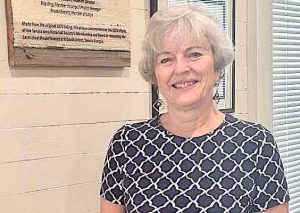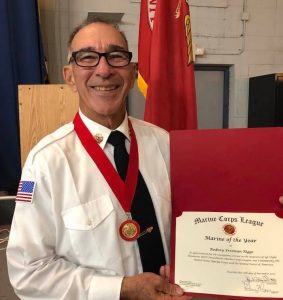The public comments portion at the meetings of the Coweta County Commission often center on specifically local issues and concerns. But the comments of 26-year-old Coweta County resident Lindsey Bush at the June 5 meeting felt more like a call to arms for someone determined to make a change in the state and federal system.
As someone who suffered traumatic brain injury (TBI) more than a decade ago and has completed an undergraduate degree, Lindsey called on the commission to support her efforts to have TBI individuals accepted under the Americans with Disabilities Act.
Articulate in her comments to the commission, Lindsey explained her situation and her mission.
Lindsey is now 26 years old. At age 15 she was involved in a traffic accident that left her comatose for nine months. She came out of the coma but faced what many people would consider insurmountable odds for any kind of recovery.
“The right side of my body was paralyzed, including my vocal cords. My lungs collapsed, my ribs were broken, my pelvis was shattered, and my brain sheared internally along the pons, corpus callosum, medulla and cerebellum regions,” Bush said, describing her injuries. “I had no hope to live and if I did live, I would need to be put in a home.”
But such a fate was not to be hers. Along with her own obvious motivation, Lindsey received a wealth of daily rehabilitation that included, physical, occupational, speech and academic therapies. And the therapy milieu paid off.
“I graduated high school on time and with honors, graduated from college with a B.S. in Education with a major in speech language pathology and a minor in nursing. I have lived to tell the tale and have seen how citizens of the United States react to disabilities,” Lindsey said.
Perhaps most people coming through what Lindsey did would be satisfied with their accomplishments and on top of the world. As for Lindsey, her attitude is certainly one that is on top of the world but when it comes to her accomplishments she is just getting started. She graduated from the University of West Georgia in 2011 with the intention of continuing her academic studies by earning a master’s degree in speech pathology so she could return some of the help she received as a TBI patient. But getting in a master’s program is problematic for her, not because it requires an overall 3.0 GPA which she has, but because there are so many people wanting to enter the program with higher GPAs it prevents those with the 3.0 GPAs from being accepted.
“I graduated on the dean’s list my last year of college, with a 3.45 GPA in my major program. I meet all the requirements of the Americans with Disabilities Act and Individuals with Disabilities Education Act,” Lindsey said, explaining that current guidelines do not allow TBI to be factored in when universities are considering admissions. “You would think I would be easily accepted, but not so. I meet the requirements set out by the universities I have applied to. I have been turned down by 14 universities after sharing my personal story and my struggles, explaining why my overall GPA, a 3.08 after eight years of school and over 185 credit hours, was largely due to the fact that I was in a coma at the age of 15 and had to re-learn everything and how to do things like eat, spell, add, subtract and write my name.”
Lindsey has spoken, often in person and sometimes on multiple occasions, with the University of Georgia, Georgia State University, University of West Georgia, Valdosta State University, Armstrong State University, University of Tennessee-Knoxville, East Tennessee State University, Appalachian State University and University of Southern Alabama.
For her efforts to date, Lindsey has no acceptance letter from any university. And for many people that might be the end of the road. But as if her own motivation was not enough, Lindsey met Saul Raisin.
A former professional cyclist, Raisin came face-to-face with TBI during a race in Italy. His recovery in Atlanta inspired him to create a foundation, raisinhope.org, and he has written a book to raise awareness for Traumatic Brain Injuries, Lindsey said.
“We met at my former hospital during a B.R.A.I.N. program I was working for and his foundation sponsored. We have volunteered at several places raising awareness for traumatic brain injuries and we know that something needs to change. We both know what it is like to be on top of your game and all of a sudden everything crashes and you are left with only your soul,” Lindsey noted.
Even a brief conversation with Lindsey Bush leaves the unmistakable impression that this woman will not be dissuaded, either by the wall blocking the continuation of her academic pursuits or by a much larger wall, a federal wall, that sidesteps those with TBI issues. And that is what brought Lindsey to the Coweta County Commission on June 5. Her compelling story is why the commission agreed to issue a letter of support agreeing that the federal government change the Americans with Disabilities Act to include TBI individuals.
“Soldiers are returning with TBI and Post-traumatic Stress Disorder after fighting for our freedom and they do not receive the correct treatment or help. Instead, society shuns them and treats them as if they are a waste of space,” Lindsey elaborated. “TBI’s are becoming prevalent in the U.S., yet there is no mention of TBI in ADA or the Rehabilitation Act and there is no governing system in place explicitly protecting the civil rights and liberties of U.S. citizens with TBI. U.S. citizens do not recognize TBI because the damage occurs inside the brain. Numerous agencies and organizations have been created to assist with this cause and still, nothing changes. Equal rights to individuals with brain injuries are not given at the local, state, or federal level.”
Articulate, and passionate, to say the least. As might be expected, Lindsey Bush is far from finished with her mission to fight for herself and others with traumatic brain injury. It will be interesting to see what happens next.











Leave a Comment
You must be logged in to post a comment.